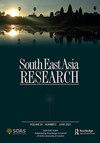唤起歧义:泰国哲学与泰国研究的认识论去殖民化
IF 0.9
3区 社会学
0 ASIAN STUDIES
引用次数: 0
摘要
摘要:当泰国东北部的村民被要求讲述他们在当地语言游戏中与非人类phi的个人遭遇时,为什么表面上自相矛盾的说法如此普遍?受本体人类学的启发,并借鉴维特根斯坦的语言现象学,我开始探索村民关于这些遭遇的叙述的民族志描述中悖论的认识适当性。为了在认识论上使关于泰国phi的辩论非殖民化,我使用对话者关于他们遭遇的表面上自相矛盾的叙述来反思村民日常生活中交叉的多个世界。虽然对这种多样性产生的各种语言游戏及其部分不可调和的本体论语域的分析重建可能有助于从分析上化解村民叙述的悖论,但我想问,通过承认认识论多样性来识别和解决悖论的学术倾向是否再现了自然主义的霸权。泛灵论集体及其作为日常乡村生活的社会本体论的概述最终表明,与phi相遇所产生的表面悖论不仅使它们具有社会意义,而且是phi概念本身的阐述。本文章由计算机程序翻译,如有差异,请以英文原文为准。
Enunciating ambiguity: Thailand’s phi and the epistemological decolonization of Thai studies
ABSTRACT Why are ostensibly paradoxical statements so common when villagers in Thailand’s lower Northeast are asked to recount their personal encounters with the nonhumans known as phi in local language games? Inspired by the anthropology of ontology and drawing on Wittgenstein’s linguistic phenomenology, I set out to explore the epistemic appropriateness of the paradox in ethnographic accounts of villagers’ narratives about these encounters. In an attempt to epistemologically decolonize the debate on Thailand’s phi, I use interlocutors’ ostensibly paradoxical narratives about their encounters to reflect upon the multiple worlds that intersect in villagers’ everyday lives. While an analytic reconstruction of the various language games this multiplicity produces and their partly irreconcilable ontological registers may help to dissolve the paradox of villagers’ accounts analytically, I ask whether the scholarly inclination to identify and resolve paradoxes through the acknowledgment of epistemological multiplicity reproduces the hegemony of naturalism. An outline of animist collectivity and its identification as the social ontology of everyday village life finally suggests that the ostensible paradoxes that encounters with phi produce are not only what makes them socially meaningful, but also enunciations of the concept phi itself.
求助全文
通过发布文献求助,成功后即可免费获取论文全文。
去求助
来源期刊

South East Asia Research
ASIAN STUDIES-
CiteScore
1.90
自引率
0.00%
发文量
42
期刊介绍:
Published three times per year by IP Publishing on behalf of SOAS (increasing to quarterly in 2010), South East Asia Research includes papers on all aspects of South East Asia within the disciplines of archaeology, art history, economics, geography, history, language and literature, law, music, political science, social anthropology and religious studies. Papers are based on original research or field work.
 求助内容:
求助内容: 应助结果提醒方式:
应助结果提醒方式:


